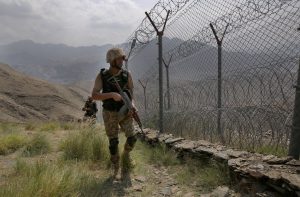Umair Jamal

On November 28, the Tehreek-e-Taliban Pakistan (TTP) ended the months-long ceasefire with the Pakistani government and ordered its fighters to stage attacks across the country. Following the end of the ceasefire, the militant group has mounted attacks on Pakistan’s security forces nationwide.
Following the TTP’s announcement of the end of the ceasefire and the uptick in attacks, Pakistan’s newly appointed Chief of Army Staff Gen. Syed Asim Munir spent a day with troops deployed along the Pakistan-Afghanistan border in the Tirah area of Khyber district. In an apparent warning to the TTP, Munir reaffirmed that the army’s fight against terrorism will continue till the achievement of enduring peace and stability in Pakistan. “No one will be allowed to disrupt the hard-earned gains of war against terror made thus far,” he said in a message aimed at the TTP leadership and its supporters.
Arguably, the ceasefire, which was facilitated by the Afghan Taliban, was never strictly implemented as the TTP continued to challenge the state’s writ. As part of the deal, Islamabad may have allowed TTP fighters to return to Pakistan with their families from Afghanistan. However, the country never allowed the group’s fighters to return with arms to continue their terror campaign and run extortion rackets. This development largely forced Pakistan to continue its counter-terrorism operations against the group – a reason TTP used to abandon the ceasefire.
The TTP’s unilateral withdrawal from the ceasefire is yet more evidence that the group never intended to lay down weapons. Its resolve to return to the battlefield shows that it has been emboldened by its sanctuaries in Afghanistan.
Pakistan seems upset with the Afghan Taliban’s refusal to dismantle TTP’s sanctuaries in Afghanistan and secure its border areas. Over the months, the Pakistan military and Afghan Taliban security forces have repeatedly clashed over the fencing of the border and the construction of new check posts. For many in Islamabad, these developments indicate that various Afghan Taliban leaders may very well be using the TTP to settle scores with Pakistan.
Munir is expected to look for a winning strategy against the TTP. Pakistan may continue with its conciliatory strategy towards the Afghan Taliban, but Islamabad appears to be in no mood to tolerate the group’s support for TTP. Therefore, the country, under the new military leadership, will raise the costs of cooperation with the TTP for the Afghan Taliban.
With the end of the ceasefire, Pakistan can now more aggressively target the group across the country. Islamabad may also consider taking the fight to Afghanistan in cooperation with other regional and international allies.
Earlier this week, the U.S. State Department designated the TTP and al-Qaida in the Indian Subcontinent (AQIS) as “Specially Designated Global Terrorists.” The U.S. has also added TTP leader Qari Amjad, who carries out attacks in northwest Pakistan, to its list of global terrorists.
Washington’s renewed calls to bring the TTP to heel came after the group called off the ceasefire with Pakistan. The timing of the development is interesting as it shows Pakistan appears to be working closely with the U.S. to hold the TTP accountable and to challenge its linkages and sanctuaries in Afghanistan. Washington’s decision to designate the TTP as a terrorist outfit alongside the AQIS essentially bars the Afghan Taliban from cooperating with these groups.
Going forward, should the Afghan Taliban continue to support the TTP leadership and fighters, this would be deemed as support to an internationally designated terrorist group.
Over the months, Pakistan has made efforts to smooth over its differences with the Afghan Taliban, but this policy line doesn’t appear to be working. Last month, Pakistan’s Minister of State for Foreign Affairs Hina Rabbani Khar visited Kabul to hold talks with her Afghan counterpart Amir Khan Muttaqi amid border tensions between the two countries.
Then, a day after Khar’s Afghanistan visit, a top Pakistani diplomat was targeted in an assassination attempt in Kabul. The development raised questions about the Afghan Taliban’s ability and willingness to protect Pakistan’s interests and personnel on its soil.
Seemingly, Pakistan’s efforts to push the Afghan Taliban to do more against the TTP have not produced the desired results. It remains to be seen what Munir’s policy will be if the Afghan Taliban continues to support the TTP.
However, it seems that Islamabad is fast approaching the point where it considers taking the fight against the TTP to its sanctuaries in Afghanistan as a more feasible approach to securing its borders.
The coming weeks will further put Pakistan’s ties with the Afghan Taliban under the spotlight as Islamabad perhaps looks to break the existing impasse in the conflict.
No comments:
Post a Comment